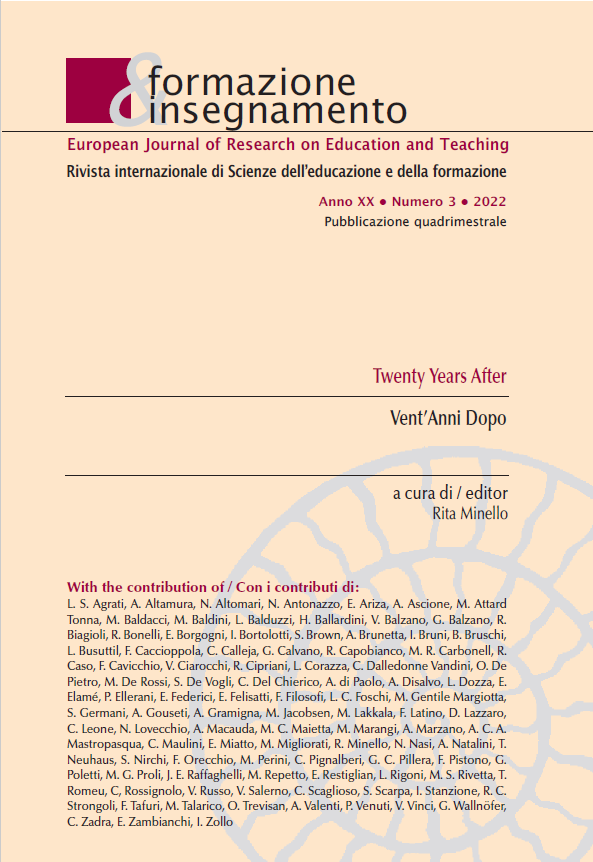Flipped learning e sperimentazione didattica universitaria: Un’esplorazione con metodo misto sull’ambiente di apprendimento online e l’interazione tra pari
DOI:
https://doi.org/10.7346/-fei-XX-03-22_29Parole chiave:
Classe capovolta, Flipped learning, Episodi critici, Metodo misto, Apprendimento medialeAbstract
Nel contesto di un progetto di ricerca internazionale Erasmus+ sulle competenze trasversali e le tecnologie didattiche, il contributo affronta il tema dell’innovazione nell’insegnamento universitario attraverso la sperimentazione di un corso in modalità capovolta, indagando alcuni elementi peculiari del modulo pilota condotto nell’ultimo biennio presso l’Università degli Studi di Catania. Seguendo una prospettiva metodologica caratterizzata da un metodo misto, il contributo analizza i risultati ottenuti dalla somministrazione di strumenti quantitativi, volti a valutare l’esperienza di studentesse e studenti sulla piattaforma e-learning utilizzata, e strumenti qualitativi di tipo narrativo, messi a punto appositamente con lo scopo di esplicitare eventuali episodi critici verificatisi durante il corso. L’indagine mira a porre in relazione l’esperienza di studentesse e studenti con aspetti motivazionali e d’interazione con l’ambiente digitale per l’apprendimento individuale e con i colleghi all’interno dei gruppi di lavoro.
Riferimenti bibliografici
Abbagnano, N. (1974). Il neo-empirismo. In N. Abbagnano (Ed.), Storia della filosofia, vol. 3: La filosofia del Romaticismo; La filosofia tra il secolo XIX e il XX (pp. 731–783). Torino: UTET.
Pillera, G. C. (2014). Collaborare online per la progettazione educativa: Un ambiente web di scrittura collaborativa come laboratorio nella formazione universitaria. Studi sulla Formazione, 17(2), 183–198. https://doi.org/10.13128/Studi_Formaz-16187
Bateson, G., & Bateson, M. C. (1987). Fear: Towards an Epistemology of the Sacred. New York: Macmillan.
Bergmann, J., & Sams, A. (2012). Flip your classroom: Reach every student in every class every day. Washington: ISTE/ASCD.
Bevilacqua, A. (2018). Flipped Learning in ambito universitario. Lecce: Pensa MultiMedia.
Bloom, B. S. (1973). Recent developments in mastery learning. Educational Psychologist, 10(2), 53–57. https://doi.org/10.1080/00461527309529091
Calderhead, J. (1989). Reflective teaching and teacher education. Teaching and Teacher Education, 5(1), 43–51. https://doi.org/10.1016/0742-051X(89)90018-8
Coco, E., Pillera, G. C., & Strongoli, R.C. (2021). Flipped classroom e approccio filosofico alla progettazione didattica universitaria: Un caso di sperimentazione internazionale. Annali del Dipartimento di Scienze della Formazione, 20, 231–246. http://dx.doi.org/10.15169/unict-asdf.20.2021.11.
Coco, E., Pillera, G. C., & Strongoli, R.C. (2022). “Capovolgere” la didattica universitaria: sperimentazione di una flipped classroom nel framework della Community of Inquiry. Ricerche di Pedagogia e Didattica – Journal of Theories and Research in Education, 17(3), 1–23. https://doi.org/10.6092/issn.1970-2221/14686
De Simone, G., & Annarumma, M. (2018) (eds.). Multidimensionalità mediale e complessità educativa: Affordance tecnologiche per una didattica 3.0. Lecce: Pensa Editore.
Dixson, M.D. (2015). Measuring student engagement in the online course: The Online Student Engagement Scale (OSE). Online Learning, 19(4). http://dx.doi.org/10.24059/olj.v19i4.561.
Karabulut‐Ilgu, A., Jaramillo Cherrez, N., Jahren, C. T. (2018). A systematic review of research on the flipped learning method in engineering education. British Journal of Educational Technology, 49(3), 398–411. https://doi.org/10.1111/bjet.12548
EMEAstartups (2016). Is AI-powered social learning the future of edutech?. EMEAstartups.com. Retrieved September 30, 2022, from https://emeastartups.com/is-ai-powered-social-learning-the-future-of-edutech/4189
Lage, M. J., Platt, G. J., & Treglia, M. (2000). Inverting the Classroom: A Gateway to Creating an Inclusive Learning Environment. The Journal of Economic Education, 31(1), 30–43. https://doi.org/10.2307/1183338
Laugwitz, B., Held, T., & Schrepp, M. (2008). Construction and evaluation of a user experience questionnaire. In Symposium of the Austrian HCI and usability engineering group (pp. 63–76). Berlin, Heidelberg: Springer.
Lincoln Y. S., & Guba E. G. (2000). Paradigmatic Controversies, Contradictions, and Emerging Confluences. In N. K. Denzin, Y. S. Lincoln (Eds.), Handbooks of Qualitative Research (pp. 163–188). Thousand Oaks: Sage.
Lipari, D. (2009). Progettazione e valutazione nei processi formativi. Roma: Edizioni lavoro.
Neumann, J. W. (2013). Developing a new framework for conceptualizing “Student-Centered Learning”. The Educational Forum, 77(2), 161–175. https://doi.org/10.1080/00131725.2012.761313
Osgood, C. E., Suci, G. J., & Tannenbaum, P. H. (1957). The measurement of meaning. University of Illinois press.
Patton, M. Q. (1997). The Paradigme Debate and Utilitatian Synthesis. Thousand Oaks: Sage.
Rivoltella, P. C. (2019). Media education: Idea, metodo, ricerca. Brescia: Scholé Morcelliana.
Schrepp, M. (2015). User experience questionnaire handbook: All you need to know to apply the UEQ successfully in your project (Version 8). UEQ-Online. Retrieved September 30, 2022, from https://www.ueq-online.org/Material/Handbook.pdf
Scriven, M. (1995). The Logic of Evaluation and Evaluation Practice. New Developments in Evaluation, 68, 49–70. https://doi.org/10.1002/ev.1019.
Strongoli, R. C. (2021). University education and digital technologies: A critical reflection on the flipped learning model. Formazione Lavoro Persona, 1(33), 216–230.
Suhonen, S. (2019). Comparison of MOODLE and Claned in physics online learning and teaching. Proceedings of the 10th International Conference on Physics Teaching in Engineering Education PTEE 2019: The Hague University of Applied Sciences, Delft, The Netherlands, May 23-24, 2019. Delft: The Hague University of Applied Sciences. https://sefiphysics.be/mirror_PTEE2019/proceedings/PTEE_2019_article-O2.pdf
Varisco, B. M. (2002). Costruttivismo socio-culturale. Roma: Carocci.
Wittegenstein, L. (1953). Philosophische Untersuchungen. Oxford: Basil Blackwell.
##submission.downloads##
Pubblicato
Come citare
Fascicolo
Sezione
Licenza
Copyright (c) 2022 Giuseppe Carmelo Pillera, Raffaella Carmen Strongoli

TQuesto lavoro è fornito con la licenza Creative Commons Attribuzione 4.0 Internazionale.
Formazione & insegnamento è distribuita con la seguente licenza: Attribution 4.0 International (CC BY 4.0).
Per ulteriori dettagli, si rimanda alle Politiche di archiviazione e ai Termini di Copyright e Licenza.





